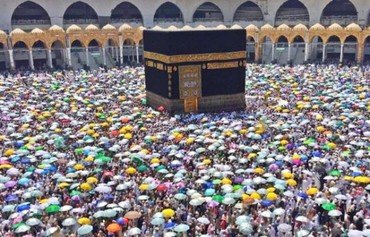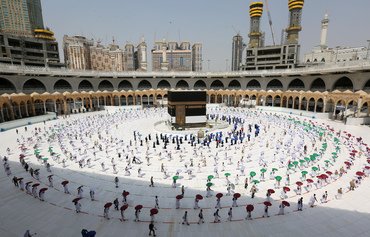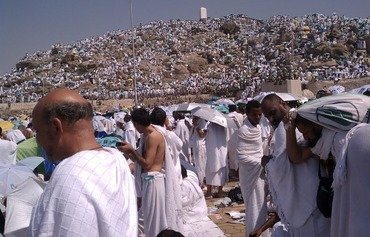Saudi authorities have rolled out strict new measures to secure the upcoming hajj season and protect pilgrims against possible acts of terrorism, officials tell Al-Mashareq.
These include boosting the number of security personnel and counter-terrorism forces to match the expected increase in the number of pilgrims following the recent Grand Mosque expansions, said Col. Jamal al-Nukhaifi of the Saudi police.
The new security measures, although strict, will not disturb the pilgrims or impinge in any way on the stages of the hajj rituals, he told Al-Mashareq.
The Grand Mosque campus and other areas visited by pilgrims have been equipped with 1,000 new surveillance cameras that are directly linked to the central operations room for security monitoring and intervention, he said.
Also this year, the kingdom will introduce electronic identification bracelets.
These will be distributed to pilgrims, who will need to wear them for the duration of their stay in the kingdom, al-Nukhaifi said.
The bracelet holds all the personal and medical data related to the pilgrim, he explained, and is connected to a global positioning system (GPS) to enable the authorities to track any suspicious movements.
The police are able to access the data contained in the bracelet via a special app installed on their smartphones, he said.
National and international co-operation
Most government ministries have participated in the effort to secure this year's hajj season, al-Nukhaifi said, led by the Ministry of Health and the Ministry of Hajj and Umrah Affairs.
Full co-operation also has been established with the security authorities of countries sending pilgrims, he said, for the performance of background checks and the exclusion of those suspected of having ties to extremist groups.
Security teams deployed at the Grand Mosque campus in Mecca and other areas where hajj ritual are conducted are in full co-ordination with medical groups, he said, and are prepared to respond to potential biological hazards.
Security measures include preventing people from infiltrating Saudi Arabia under the pretext of performing hajj, al-Nukhaifi said, noting that surveillance has been increased at all ports and crossings to stop anyone from entering without official permits from their own country and Saudi authorities.
Numerous threats to security
Security threats during the hajj season are not limited to suicide bombings or improvised explosive devices (IEDs), but are rather numerous and complex, said former Saudi army officer and military attaché Maj. Gen. Mansour al-Shehri.
Therefore the plans to secure the hajj season are comprehensive and require a lot of pre-planning and preparation, he told Al-Mashareq.
Threats could include the incitement of protests by infiltrators, he said, as well as attempts to release viruses or toxic substances in enclosed areas or tunnels.
Saudi Arabia is being targeted by many parties, al-Shehri added, hence the need to safeguard the security and safety of the hajj season.
Groups such as al-Qaeda and the "Islamic State of Iraq and the Levant" (ISIL) pose a threat, he said.
Furthermore, he added, the kingdom is in a direct war against terrorism, through its participation in the international coalition to fight ISIL in Syria and its crackdown on sleeper cells inside Saudi territory.
There have been numerous attempted acts of terrorism in the kingdom in recent months, he said, some of which were thwarted by the security forces, while others succeeded in taking lives and causing destruction.
Information obtained from recent arrests carried out during security crackdowns will be of help in uncovering potential terrorist plots, he added.
Medical teams on standby
Medical teams will be on standby starting the first day that pilgrims arrive in Saudi Arabia, said Dr. Jamil al-Masoudi, field officer at the Saudi Ministry of Health in the Mecca region.
The teams have been trained on rapid intervention to counter any potential act of terrorism or crowd stampede, he told Al-Mashareq, and are equipped with the most advanced medical and electronic equipment.
This includes medical scanning equipment that can quickly detect viruses or biological or toxic substances to respond quickly to them, he said, adding that the electronic bracelet will facilitate the work of security and medical agencies.
The kingdom has worked with some countries to provide their pilgrims with electronic bracelets, he added, while the Ministry of Health also held crisis management workshops in co-operation with a number of international universities with expertise in this field.
The ministry also set up a risk assessment department, he said, which offered medics in the field training to help them cope with any potential crisis during the performance of the hajj rituals.
Measures previously in place prevent pilgrims from coming to Saudi Arabia unless they have received all the necessary vaccinations and are free of airborne-transmitted diseases that could pose a threat to public health, he said.
To safeguard those who enter the kingdom, 20,000 civil defence personnel supplied with more than 4,000 vehicles equipped with the most advanced equipment have been trained and deployed to strategic points to respond to any emergency, he added.

![Pilgrims from all over the world arrive at King Abdulaziz International Airport in Jeddah. [Photo courtesy of the Saudi Press Agency]](/cnmi_am/images/2016/08/17/6037-Saudi-mecca-hajj-600_384.jpg)






